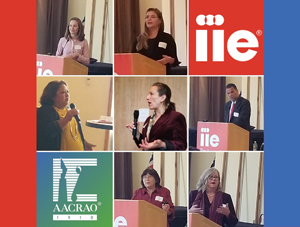
More than 68.5 million people are today asylum seekers, internally displaced persons or refugees, due to conflict, persecution, and natural disaster. The average length of time one of these 68.5 individuals will spend in exile is about 20 years, and only 1% will have access to higher education.
In the current U.S. political climate, with the rhetoric used to speak of vulnerable populations, and the changes being made to visa, immigration and asylum regulations, advising and admitting vulnerable students may not be a priority for many HEIs, and may be a conversation that is not supported by administration. However, it is precisely because of this that U.S. institutions need to have the tools put in place now in order to support the next population of vulnerable students.
At the institutional and policy levels, we are charged with making sure we have the mechanisms and tools in place, to not only welcome future refugee populations, but to admit them. It is through this lens that AACRAO and IIE PEER saw the need to collaborate and bring together expertise in the field of admission, recruitment and visa regulations to support institutions in navigating this space.
Workshop highlights the unique role of institutions
On October 26, 2018, AACRAO and IIE PEER hosed a one-day workshop on Best Practices in Admitting Vulnerable Student Populations to U.S. Campuses at the IIE Headquarters in New York City, with the aim to equip participants with the tools to support access and student success. Participants, representing two and four-year U.S. higher education institutions, non-profits and foundations, U.S. Department of State, and credential evaluation organizations, came together to discuss opportunities and challenges in the admission of vulnerable student populations to U.S. campuses.
The workshop began with opening remarks by Nele Feldmann, Head IIE-PEER, and Annetta Stroud, Associate Director of Training and Program Development, AACRAO, that helped to frame the domestic perspective and to highlight the unique importance U.S. higher education institutions have to support access for these populations as well as for further integration into the larger community. Following the opening remarks, the keynote speaker Dr. Kyle Farmbry, Dean of Graduate School Rutgers University – Newark, gave an impassioned speech that asks us to consider why people leave and how this can help frame our views and perspectives. The keynote was followed with two institutional case studies that showcased different paradigms in the recruitment, admission and integration process, the first from a private four-year university and the second a large metropolitan community college system. Though both institutions have a different mission and scope, the commitment to student success of these vulnerable students by shows where parallels of practice are that can be used at various types of institutions. After the institutional cases were presented, the group broke out into two working sections: Navigating Visa Regulations and Aligning International Recruitment & Admissions. Each group was presented with invaluable information and examples, and further tools and best practices were discussed.
Student stories
In understanding that motivating institutions, policy makers, and all stakeholders to support vulnerable students through the entire student life-cycle is best done through personal student histories, the workshop highlighted two empowering student stories. The first was shared by Dogon Nshimiyimana, a masters student at New York University, originally from the Democratic Republic of Congo, and the second from Sinan Zeino, a masters student at Columbia University, originally from Syria. Although both individuals shared very different personal histories, the underlying theme was the power and importance of higher education, and how the support mechanisms they were able to utilize all the way through the application stage to degree award was paramount to their success. It is through these stories of student success that we as higher education advocates understand that it takes a village of expertise to support these populations within U.S. higher education.
The joint IIE PEER-AACRAO workshop brought together over 40 individuals with unique expertise in the area of vulnerable student access and success in U.S. higher education institutes, and through the in-depth conversations, a set of tools and best practices was discussed and will be released by IIE PEER and AACRAO late 2018.